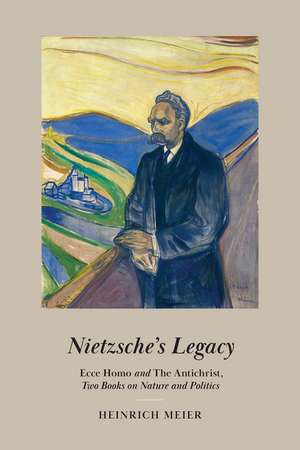Nietzsche's Legacy: "Ecce Homo" and "The Antichrist," Two Books on Nature and Politics
Autor Heinrich Meier Traducere de Justin Gottschalken Limba Engleză Hardback – 19 mar 2024
Nietzsche's Legacy takes on the most challenging and misunderstood works in Nietzsche’s oeuvre to illuminate his view of what a philosopher is and what constitutes a philosophic life. Interpreting Ecce Homo and The Antichrist as twin books meant to replace the abandoned Will to Power project, Heinrich Meier recovers them from the stigma of Nietzsche’s late mental collapse, showing that these works are, above all, a lucid self-assessment. The carefully written pair contains both the highest affirmation—the Yes of the “revaluation of all values”—and the most resolute negation—the No to Christianity. How the Yes and the No go together, how the relation between nature and politics is to be determined, how Nietzsche’s intention is governing the political-philosophical double-face: this is the subject of Nietzsche’s Legacy, which opens up a new understanding of Nietzsche’s philosophy as a whole.
Preț: 342.57 lei
Nou
Puncte Express: 514
Preț estimativ în valută:
65.56€ • 68.06$ • 54.67£
65.56€ • 68.06$ • 54.67£
Carte disponibilă
Livrare economică 01-15 martie
Livrare express 15-21 februarie pentru 36.16 lei
Preluare comenzi: 021 569.72.76
Specificații
ISBN-13: 9780226751979
ISBN-10: 022675197X
Pagini: 288
Dimensiuni: 152 x 229 x 28 mm
Greutate: 0.54 kg
Editura: University of Chicago Press
Colecția University of Chicago Press
ISBN-10: 022675197X
Pagini: 288
Dimensiuni: 152 x 229 x 28 mm
Greutate: 0.54 kg
Editura: University of Chicago Press
Colecția University of Chicago Press
Notă biografică
Heinrich Meier is director emeritus of the Carl Friedrich von Siemens Foundation, professor of philosophy at the University of Munich, and permanent visiting professor in the John U. Nef Committee on Social Thought at the University of Chicago. Justin Gottschalk is the translator of Heinrich Meier’s previous book What Is Nietzsche’s Zarathustra? He lives outside Washington DC.
Cuprins
Preface
Note on Citations
First Book. Nature and Politics I
Ecce Homo: How One Becomes What One Is
I. Life
II. Wisdom
III. Task
IV. Crisis
V. Knowledge
VI. Conflict
Second Book. Nature and Politics II
The Antichrist: Curse on ChristianityI. Friends
II. Enlightenment
III. History
IV. Faith
V. Rulership
VI. Enemies
Appendix. Twilight of the Idols, or, How One Philosophizes with the HammerThe Philosopher among Nonphilosophers
Note on Citations
First Book. Nature and Politics I
Ecce Homo: How One Becomes What One Is
I. Life
II. Wisdom
III. Task
IV. Crisis
V. Knowledge
VI. Conflict
Second Book. Nature and Politics II
The Antichrist: Curse on ChristianityI. Friends
II. Enlightenment
III. History
IV. Faith
V. Rulership
VI. Enemies
Appendix. Twilight of the Idols, or, How One Philosophizes with the HammerThe Philosopher among Nonphilosophers
Recenzii
“Step by step Meier follows Nietzsche’s last paths of thought, in which the philosopher proves to be the master of his decisions at all times, despite all the apparent shrillness of tone. Meier has an unerring eye for the architecture of Nietzsche's revaluative philosophizing and the structure of his works, and meticulously works out the strategies Nietzsche used to beguile his readers. . . . An exceedingly precise analysis.”
“With Nietzsche’s Legacy, Meier presents an exceptionally dense, painstaking, and prudent interpretation of Nietzsche’s late work."
“Nietzsche’s two last books are routinely dismissed as evidence of his growing mental instability, his megalomania, and they have not traditionally been considered important parts of his corpus. Meier’s book makes that claim impossible to maintain. He has in fact, for the first time, unlocked these books and demonstrated in luxurious detail just how carefully written and central they are to understanding Nietzsche’s view—not only of his accomplishments, but of himself, what it means to be a philosopher, and how he understands his legacy. Meier has rescued these books and brought to light a subtlety and depth of thought never before suspected, much less explored.”
